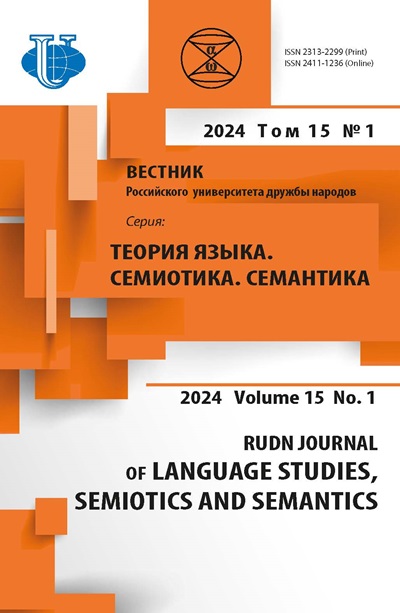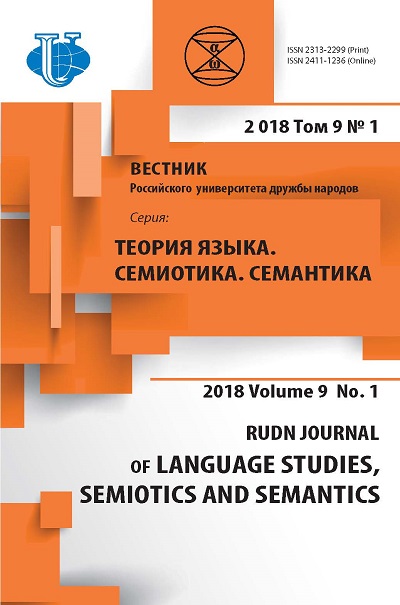Political discourse as object of linguistic analysis
- Authors: Sukhanov Y.Y.1
-
Affiliations:
- Military University
- Issue: Vol 9, No 1 (2018)
- Pages: 200-212
- Section: POLITICAL LINGUISTICS. SCIENCE 21.0
- URL: https://journals.rudn.ru/semiotics-semantics/article/view/18277
- DOI: https://doi.org/10.22363/2313-2299-2018-9-1-200-212
Cite item
Full Text
Abstract
The urgency of the work is due to the fact that at the present stage of development political linguistics is considered one of the most rapidly developing and most promising areas of linguistics. The name of this direction indicates the subject of his research - political linguistics is engaged in the study of “political communication”, that is, speech activity that is oriented to the propagation of certain ideas, emotional impact and motivation of citizens to political actions, to accept and substantiate political and social decisions in the conditions of many points of view in society, for the development of public consent. The goal of political linguistics is to study the various relationships between the political state of society, the subjects of political activity, communication, thinking and language. That is why the main task of political linguistics is to study the relationship between subjects of political activity, communication, thinking, language and the political state of society. In modern linguistics, one of the most developing areas is political linguistics. This position can be defined as evidence of the extensive involvement of the society in political processes and, as a result, the increased interest of science in communication in the political sphere. The following research methods are used in this article: stylistic, syntactic and lexical-semantic analysis of fragments of texts; semiotic analysis; elements of the component analysis of lexical units; elements of content analysis; descriptive method and its main components (observation, interpretation, generalization). Foreign and domestic researchers turned to the study of various aspects of the pre-election discourse. In particular, the studies of Bazylev VN, Bokmelder DA, Budaeva EV, Vodak R., Repina EA, Chudinova AP are devoted to the political discourse. Bakumova EV, Baranova AN, Sineoki NA, Sheigala EI and other scientists. The work of such scientists as Borbotko VG, Karasik VI, Makarov ML, Cherniavskaya VE devoted to the study of cognitive linguistics, theory and history of discourse development in science. and others.
Keywords
About the authors
Yury Yurievich Sukhanov
Military University
Author for correspondence.
Email: ngeru@mail.ru
post-graduate of Military University English department; Interests: political linguistics, sociolinguistics
14 Bolshaya Sadovaya Str., Moscow, Russian Federation, 123001References
- Akopov, D.R. (2013). Strategies and tactics of political discourse. Bulletin of Nizhnevartovsk State University, 6(1), 403—409. (In Russ). (In Russ).
- Bakhtin, M.M. (2007). Problem of speech genres. In: Social psycholinguistics. Moscow: The Labyrinth. pp. 197—236. (In Russ).
- Basyrov, N.T. (2009). Political discourse. Academic innovative University. URL: http://www.rusnauka.com/15_NPN_2009/Politologia/46717.doc.htm (accessed: 24.12.2017.).
- Bell, V. (1995). Negotiation in the workplace: The view from a political linguist. In: The discourse of negotiation: Studies of language in the workplace. Oxford etc.: Pergamon. pp. 41—58.
- Chernyavskaya, V.E. (2001). The Discourse as object of linguistic research. In: Text and discourse. Problems of economic discourse: Sat. scientific. Tr. SPb.: S. Petersb. State University of Economics and Finance. (In Russ).
- Chudinov, A.P. (2006). Political linguistics. Moscow: Flinta:Nauka. (In Russ).
- Demyankov, V.Z. (2002). Political discourse as a subject of political science Philology. Political science. Political discourse: History and modern studies, 3, 32—43. (In Russ).
- Gorelov, I.N. & Sedov, K.F. (2001). Fundamentals of psycholinguistics. Textbook. Moscow: The Labyrinth. (In Russ).
- Karasik, V.I. (2007). The Discourse. In: Social psycholinguistics: a reader. Moscow: The Labyrinth. pp. 162—196. (In Russ).
- Karasik, V.I. (2000). The types of discourse. In Linguistic personality: institutional and personal discourse: Collected scientific. Volgograd: Peremena. pp. 5—20. (In Russ).
- Khalatyan, A.B. (2011). Pre-Election discourse: genre originality and the specificity of linguistic realization (on the material of texts of pre-election campaigns of 2008 in Russia and the USA): [dissertation] (In Russ).
- Khalatyan, A.B. (2011). Pre-Election discourse. Political Linguistics. Stavropol, 2, 180—187. (In Russ).
- Khalatyan, A.B. (2010). The organization of modern political discourse. Bulletin of Moscow State Regional University. Series: Linguistics, 6, 51—54. (In Russ).
- Mikhaleva, O.L. (2009). Political discourse. The specificity of manipulative influence. Moscow: “LIBROKOM”. (In Russ).
- Novikova, A.M. (2016). The Contents of the linguistic view of a political world. The Translation and comparative linguistics, 12, 111—113. (In Russ).
- Parshina, O.N. (2007). Russian political discourse: Theory and practice. Moscow: LKI. (In Russ).
- Redko, L.L. & Bobreshova, S.V. (Ed.). (2011). Pedagogical science and practice of region. In: Materials of the XIII regional scientific-practical conference (Moscow, GOU VPO Saratov State Pedagogical University). Stavropol. (In Russ).
- Perelgut, N.M. & Sukhotsky, E.B. (2013). On the structure of the concept of “political discourse”. Bulletin of Nizhnevartovsk State University, 2, 35—41. (In Russ).
- Chudinov, A.P. (Ed.). (2011). Political linguistics. Vol. 2(36). Yekaterinburg. (In Russ).
- Sedov, K.F. (2007). Man in the genre space of everyday communication. In: The anthology of speech genres: everyday communication. Moscow: The Labyrinth. pp. 7—38. (In Russ).
- Sheigal, E.I. (2004). Semiotics of political discourse. Volgograd. (In Russ).
- Solganik, G.J. (2012). The Language of media and politics. Moscow. URL: http://lib.sale/ jurnalistika-books/funktsionalnaya-tipologiya-znakov-71570.html (accessed: 20.12.2017).
- Volkova, T.A. (2011). Discourse-communicative model of translation in the study of institutional discourse. Bulletin of the Chelyabinsk State University, 17, 37—42. (In Russ).
- Wodak, R. (2006). Mediation between discourse and society: assessing cognitive approaches in CDA. Discourse and society, 8, 179—190.
- Zhbankov, M.M. (2013). Genre system as an institutional characteristic of the discourse of clinical. URL: http://referatdb.ru/medicina/160038/index.html (accessed: 24.12.2017).













